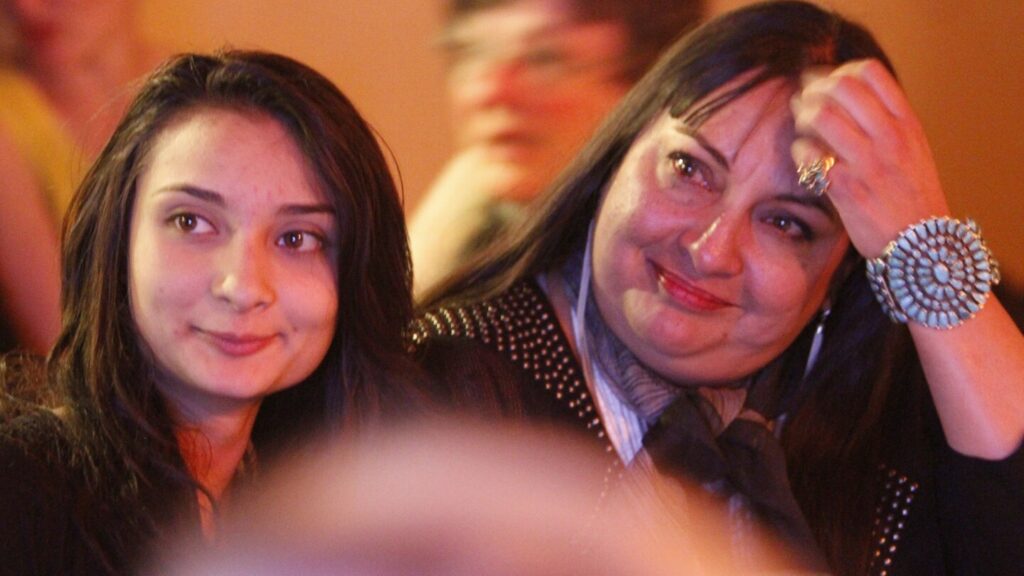SANTA FE, N.M. (AP) — Fashion designers from across North America are bringing inspiration from their Indigenous heritage, culture and everyday lives to three days of runway modeling starting Friday in a leading creative hub and marketplace for Indigenous art.
A fashion show affiliated with the century-old Santa Fe Indian Market is collaborating this year with a counterpart from Vancouver, Canada, in a spirit of Indigenous solidarity and artistic freedom. A second, independent runway show at a rail yard district in the city has nearly doubled the bustle of models, makeup and final fittings.
Three days of runway shows set to music will have models that include professionals and family, dancers and Indigenous celebrities from TV and the political sphere.
Clothing and accessories rely on materials ranging from of silk to animal hides, featuring traditional beadwork, ribbons and jewelry with some contemporary twists that include digitally rendered designs and urban Native American streetwear from Phoenix.
“Native fashion, it’s telling a story about our understanding of who we are individually and then within our communities,” said Taos Pueblo fashion designer Patricia Michaels, of “Project Runway” reality TV fame. “You’re getting designers from North America that are here to express a lot of what inspires them from their own heritage and culture.”
Santa Fe style
The stand-alone spring fashion week for Indigenous design is a recent outgrowth of haute couture at the summer Santa Fe Indian Market, where teeming crowds flock to outdoor displays by individual sculptors, potters, jewelers and painters.
Designer Sage Mountainflower remembers playing in the streets at Indian Market as a child in the 1980s while her artist parents sold paintings and beadwork. She forged a different career in environmental administration, but the world of high fashion called to her as she sewed tribal regalia for her children at home and, eventually, brought international recognition.
At age 50, Mountainflower on Friday is presenting her “Taandi” collection — the Tewa word for “Spring” — grounded in satin and chiffon fabric that includes embroidery patterns that invoke her personal and family heritage at the Ohkay Owingeh Pueblo in the Upper Rio Grande Valley.
“I pay attention to trends, but a lot of it’s just what I like,” said Mountainflower, who also traces her heritage to Taos Pueblo and the Navajo Nation. “This year it’s actually just looking at springtime and how it’s evolving. … It’s going to be a colorful collection.”
More than 20 designers are presenting at the invitation of the Southwestern Association for Indian Arts.
Fashion plays a prominent part in Santa Fe’s renowned arts ecosystem, with Native American vendors each day selling jewelry in the central plaza, while the Institute for American Indian Arts delivers fashion-related college degrees in May.
This week, a gala at the New Mexico governor’s mansion welcomed fashion designers to town, along with social mixers at local galleries and bookstores and plans for pop-up fashion stores to sell clothes fresh off the fashion runway.
International vision
A full-scale collaboration with Vancouver Indigenous Fashion Week is bringing a northern, First Nations flair to the gathering this year with many designers crossing into the U.S. from Canada.
Secwépemc artist and fashion designer Randi Nelson traveled to Santa Fe from the city of Whitehorse in the Canadian Yukon to present collections forged from fur and traditionally cured hides — she uses primarily elk and caribou. The leather is tanned by hand without chemicals using inherited techniques and tools.
“We’re all so different,” said Nelson, a member of the Bonaparte/St’uxwtéws First Nation who started her career in jewelry assembled from quills, shells and beads. “There’s not one pan-Indigenous theme or pan-Indigenous look. We’re all taking from our individual nations, our individual teachings, the things from our family, but then also recreating them in a new and modern way.”
Urban Indian couture
Phoenix-based jeweler and designer Jeremy Donavan Arviso said the runway shows in Santa Fe are attempting to break out of the strictly Southwest fashion mold and become a global venue for Native design and collaboration. A panel discussion Thursday dwelled on the threat of new tariffs and prices for fashion supplies — and tensions between disposable fast fashion and Indigenous ideals.
Arviso is bringing a street-smart aesthetic to two shows at the Southwestern Association for Indian Arts runway and a warehouse venue organized by Amber-Dawn Bear Robe, from the Siksika Nation.
“My work is definitely contemporary, I don’t choose a whole lot of ceremonial or ancestral practices in my work,” said Arviso, who is Diné, Hopi, Akimel O’odham and Tohono O’odham, and grew up in Phoenix. “I didn’t grow up like that. … I grew up on the streets.”
Arviso said his approach to fashion resembles music sampling by early rap musicians as he draws on themes from major fashion brands and elements of his own tribal cultures. He invited Toronto-based ballet dancer Madison Noon for a “beautiful and biting” performance to introduce his collection titled Vision Quest.
Santa Fe runway models will include former U.S. Interior Secretary Deb Haaland of Laguna Pueblo, adorned with clothing from Michaels and jewelry by Zuni Pueblo silversmith Veronica Poblano.
Read the full article here


